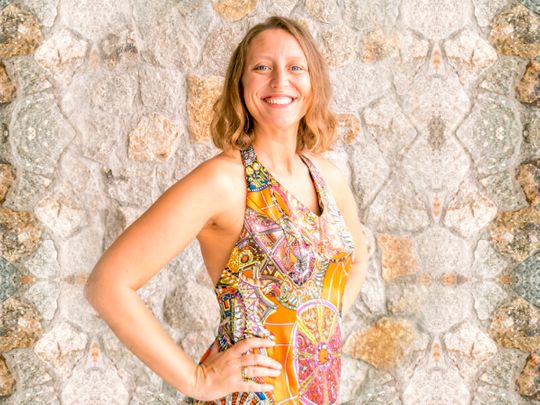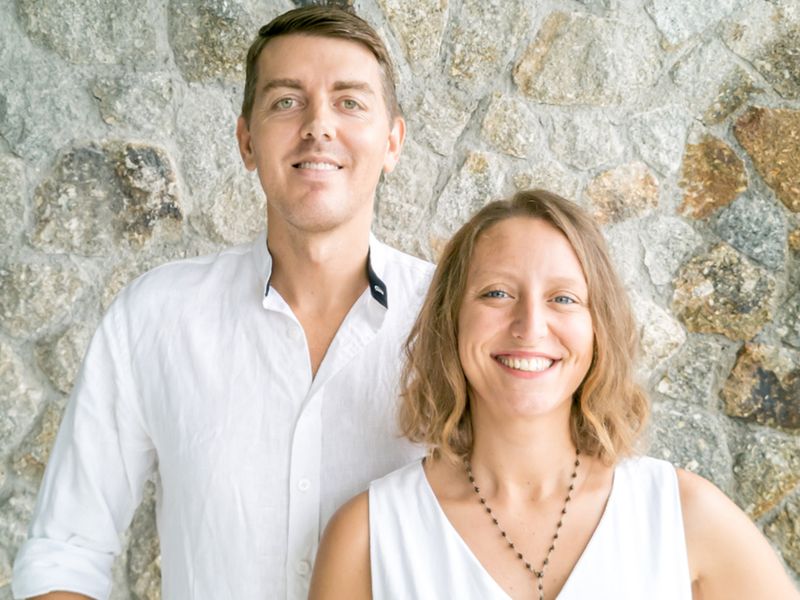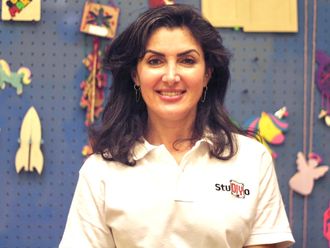
“Until you're confident that you can turn Dh1 into Dh2, you don't have a business but have an expensive hobby,” said Charlotte Stebbing-Mills, 34, a UAE-based British expat who started a couple of businesses in the scarcely-explored field of wellness lifestyle.
She has been in the health, fitness and wellness space since 2006, when she started her career as a personal trainer in the UK. This led her to work in commercial fitness chains worldwide, being responsible for multiple teams, while looking at coaching and educating as a potential business venture.
When and why did you decide to start a business in the wellness field?
The health and wellness industry encompasses all activities which promote physical and mental wellbeing: from yoga to healthy eating, personal care, nutrition and weight-loss, meditation and workplace mindfulness, among others.
However, before Stebbing-Mills stepped into this industry as an entrepreneur, she observed that a common problem holding people back from functioning or working on an optimum level was stress – be it in the corporate space, health arena or personal lives.
This was the market niche Stebbing-Mills chose to develop her latest venture, ‘Wellness Theory’, a lifestyle coaching business she started with her husband Jonathan Mills in 2019, which primarily trains individuals on how to eliminate unhealthy stress.
Until you're confident that you can turn Dh1 into Dh2, you don't have a business but have an expensive hobby
"We coach and educate in all aspects of wellness, including mental health, emotional wellbeing, physical health and environmental impact," said Stebbing-Mills. “I knew it was a niche that needed development because, aside from our observations over the years, the stats too indicated the same.”
“With the global pandemic and uncertain times still prevalent around the world, the number of people affected by these issues is only rising. Alongside this, stress has become one of the most reported medical conditions in history.”
As business owners, the couple initially worked with people across the UAE, but they later expanded the business to Saudi Arabia, the US, Australia and the UK.
What has been your experience in setting up this business?
Setting up the business was like a rollercoaster experience for Stebbing-Mills. One day it was like living the dream; the next, it felt like going bankrupt. “Understanding that building a meaningful business is the long game helped us massively.”
She said, "Expecting everything to happen immediately and for them to go your way is wishful thinking. Be it recruiting employees, on-boarding clients or vendors delivering on time, setting realistic expectations of the business helps to reduce stress of setting up a business."
Entrepreneur Tip #1: While it’s tempting to work solo at the start, invest in a team early on
She added that in the start, it might be tempting to work all hours of the day and night, but investing in a team early is a game changer in the start-up phase. "Even if it means outsourcing work to freelancers, as you cannot do it all alone. I learned this the hard way.
"Ironically, at the time, I felt like I was saving money by taking on tasks myself, but it would have saved a lot of time, energy and money in the long run. There's a network of experts out there who have what you need to succeed, and if you do your research, it won't cost as much as you might initially think. As they say - your net worth equates to the size of your network."

Entrepreneur Tip #2: Research customer base before starting, evolve according to their needs
“I relocated to UAE in 2014 from the UK to work for a leading fitness chain. Working across multiple health clubs in the GCC region in varying roles gave me great insight into consumer needs, and I had the opportunity to get to know the culture first-hand."
This is why Stebbing-Mills decided from the early days to remain focused on the customers. "Helping the customer solve their problem and ensuring they enjoy the process makes the business take care of itself. When customers are happy, so is your bottom line, and it's a win-win."
How did you manage to fund the business initially?
Stebbing-Mills funded their business by leaving their first life coaching business ‘Kaizen Life Spark’, which was launched in 2017, and investing it all in their latest business, alongside their personal savings. They also previously owned 'Rehab Revolution', which was a fitness education business.
"Our initial start-up cost was approximately Dh100,000. We broke even in the first six months and reinvested 75 per cent of earnings back into the business for the first 18 months. After this, we moved from making wages to making a profit. Three years now, we see a steady profit margin of 9.7 per cent.
"Our golden KPI (key performance indicator) is the cost per person that keeps an accurate health check on our business and guarantees smooth cash flow. We've found it's a simple and precise way of predicting the revenue and longevity of our business." (Cost per person is the total revenue divided by the number of full-time employees)
Stebbing-Mills shares 5 critical mistakes, with lessons she learnt
Mistake #1: Investing in the wrong outsourcing teams without proper review.
Lesson learnt: "Always interview at least three experts in the service you're looking for support before deciding who to work with. And always work with teams based on results, not time."
Mistake #2: Not playing to your strengths.
Although Stebbing-Mills’ passion is in working with customers to achieve their wellbeing goals, her attention was split due to the responsibilities of being a CEO, which includes knowing the health of her profit and loss (P&L). But she confessed that the nitty-gritty details did not inspire her.
Lesson learnt: "Invest in the best business mentors and inspiring team members. When working with those who have done this before, you can see your blind spots and have your finger on the pulse of the industry, so you can stick to what you're best at. It is, hands down, the best investment we've made."
We broke even in the first six months and reinvested 75 per cent of earnings back into the business. After this, we moved from making wages to making a profit, and now see a steady profit margin of 9.7 per cent
Mistake #3: Not knowing the consumers' perspective of the problem you hope to address
Lesson learnt: "Meet consumers where they are. Give them what they want; if they don't know, education needs to be part of the business strategy. Let your consumers help you make your products. Research, talk to prospects as much as possible, test everything and allow the consumer to have a vote."
Mistake #4: Invest in marketing and product development without knowing the specifics.
Lesson learnt: “Invest heavily in marketing and your product ecosystem only when you have the solution and market dialled in. For example, 9 per cent of our marketing budget goes on social media ad spend alone, with 40 per cent dedicated to specific campaigns.”
Mistake #5: Getting distracted
Lesson learnt: "There are thousands of ways to get to the same place. Not sticking to one guarantees failure. Allowing yourself to detour off track because the latest business guru suggested a new method will keep you chasing your tail. Of course, be adaptable, but stay focused on one course of action."
She added that most entrepreneurs fail because they give up on strategies too soon. "Having clear budgets for testing alongside your primary plan will help you stay on track and help you to make informed decisions about changes that need to be made."










